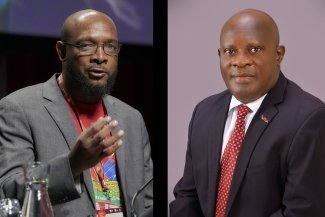The first law that will be introduced under Emmanuel Macron, the new President of the French Republic, will be about ethics in public life. The bill is currently being drafted, so that it can be adopted in the next few weeks by the future parliament. It shows just how much this issue struck a chord with public opinion during a particularly bitter presidential campaign. It continues to be the focus of attention in the run-up to the legislative elections on 11 and 18 June.
The last few months have seen the revelation of several financial scandals, notably those concerning François Fillon, the right-wing candidate, and Marine Le Pen, the far-right candidate. Let us look at some of the facts : François Fillon was accused of giving fictional posts to people close to him, as parliamentary aides, and of accepting gifts of bespoke suits worth tens of thousands of euros from a lawyer friend (at the heart of the “Françafrique” networks. (Ed. : see below).
Marine Le Pen, meanwhile, has also been the subject of an inquiry into bogus jobs as well as illegal funding for her electoral campaign. But there have been many other scandals, concerning for example former president Nicolas Sarkozy, National Assembly member Thomas Thevenoud, senator and businessman Serge Dassault, National Assembly member Patrick Balkany, as well as UBS France, HSBC...
These scandals have exacerbated the feeling that they are “all corrupt” and the crisis of confidence in politicians, already well established in France. Only 11 per cent of the French said they trusted the political parties in a survey in January 2017 by Cevipof. Seventy five per cent of those questioned also agreed that “As a general rule, France’s elected representatives and political leaders are fairly corrupt.”
This climate of suspicion surrounding its political representatives puts France in a bad position when ranked in terms of corruption. In 2016 the NGO
Transparency International ranked France 23rd out of 168 countries, just ahead of the Bahamas, Chile and the United Arab Emirates. Seven neighbouring European countries by contrast (including Denmark, Finland, Sweden, Switzerland and Germany) are in the top ten.
Why is France, known as the “homeland of human rights”, unable to set an example, or at least do as well as its European neighbours ?
While some countries do better than others, corruption affects the whole of Europe, and costs it dearly. According to a 2014 report by the European Commission, corruption costs the 28 Member States 120 billion euros (US$133 billion) per year.
The RAND Institute puts the cost even higher, at between 179 and 990 billion euros (US$200-1.105 billion), or between 1.2 per cent and 6.7 per cent of the wealth created in Europe each year.
Included in or added to these figures is tax fraud. The revelations made by the
Panama Papers in spring 2016 named several prominent personalities in France (Jérôme Cahuzac, Patrick Balkany, Michel Platini...) and companies. Top of the list was the bank Societé Générale, which was shown to be one of the biggest clients of the Panamanian group Mossack Fonseca, which specialises in offshore companies.
A whole culture to change
Estimates of the cost of corruption are of course open to discussion, given that by definition it is hidden. Transparency International’s ranking only reflects the perception of corruption. It could be very different from reality. According to the European Commission’sbarometer on corruption, in 2014, although 68 per cent of French people believed corruption was very widespread, only 2 per cent of them said they had been explicitly or implicitly invited to pay a bribe in the past year.
So is there cause for concern ? Yes, because whatever the real level of corruption, the feeling of suspicion that it engenders has a serious impact.
“Corruption is very serious because it breaks down the Rule of Law, and the distrust it creates among citizens undermines the foundations of democracy”, Chantal Cutajar, a lecturer-researcher and Executive Director of Ceifac, the European College for Financial Research and Criminal Financial Analysis at the University of Strasbourg, tells Equal Times.
“There is a feeling in France that corruption is very present, because a sense of impunity has developed,” continues Chantal Cutajar. These feelings reached a height with the Cahuzac affair, during the presidency of François Hollande, which he had hoped would be exemplary.
In 2012, the press revealed that Jérôme Cahuzac, the Budget Minister who was in charge of fighting tax fraud, had hidden bank accounts in Switzerland (an undeclared 3.5 million euros, or US$3.9 million). After having publicly lied to members of the National Assembly, the minister had to resign and finally confess. He was given a three-year prison sentence but is appealing the decision.
“In other countries, political representatives would not have been able to behave that way once a scandal had been exposed. In Sweden, the second highest ranking person in government had to resign in 1995 after buying a bar of chocolate with their government credit card,” says Chantal Cutajar.
This culture of impunity has also been reflected in the defence of the interests of enterprises abroad.
“The French state resisted incriminating influence peddling directed at foreign public agents for a long time because it felt it would hold up business development at the international level. It wasn’t until the Sapin law was introduced on 9 December 2016 that France finally agreed to penalise this behaviour” says the researcher.
In 2014, theOrganisation for Economic Cooperation and Development (OECD) was shocked to find that no French company had yet been convicted for foreign bribery in France, whereas French companies have been convicted abroad for that offence.
Three French companies (Technip, Total and Alstom) are among the ten companies that have had to pay the biggest fines to the United States for bribing public agents.
France has also found it difficult to disentangle itself from its long history of business relations and corruption in Africa, or what is widely known as “Françafrique”, the word used to describe France’s relations with and web of influence in its former colonies.
Even though French presidents Nicolas Sarkozy and François Hollande wanted to make a break with the system that has existed since the 1960s, cases still emerge and give rise to questions.
One such case was the suspected financing of Nicolas Sarkazy’s presidential campaign by Muammar Gaddafi, the former Libyan president. In the Fillon scandal, the emergence of the name of the generous donor of the luxury suits, Robert Bourgi, a friend, lawyer and “Françafrique” heir was also a troubling sign of the persistence of these networks.
Not forgetting the scandals of the “ill-acquired goods” : the luxury villas bought in France by the Bongo (Gabon) and Sassou-Nguesso (Democratic Republic of Congo) families.
Reform on the way
But the boundaries are changing. “We see from our surveys that the French are now rejecting what they could accept before, often through fatalism or resignation. The people have clear ideas about the measures that should be put in place, such as not combining mandates, transparency in the expenses of their elected representatives and making people who have been found guilty of corruption ineligible. Furthermore, transparency became a theme of the presidential campaign,” says Elsa Foucraut, head of advocacy for Transparency International France.
The ejection of Fillon in the first round of the presidential election, after starting out at the top of the opinion polls, is no doubt another indicator.
As regards reform, the movement also accelerated after the electrifying shock of the Chauzac affair. Flagship measures include the adoption of the law on transparency, fighting corruption and modernising economic life, known as Sapin 2.
Sapin 2 “will better protect whistleblowers, put an end to the impunity of French companies involved in bribing foreign public servants and oblige big companies to have a corruption prevention plan. It will also create a French anti-corruption agency,” explains Elsa Foucraut.
François Hollande also allowed the creation of the National Financial Prosecution Service (parquet national financier - PNF), specialising in major economic and financial crimes, and the creation of the High Authority for Transparency in Public Life (Haute autorité pour la transparence de la vie publique - HATVP), responsible for ensuring that members of parliament do not have conflicts of interest.
Much remains to be done however “to set better parameters for lobbying, to control the financing of political parties and above all to guarantee the independence of the courts and ensure the justice system has the necessary means to apply this arsenal of measures,” insists Chantal Cutajar.
The newly-created National Financial Prosecution Service is already staggering under the weight of the number of cases to be dealt with...









